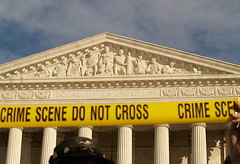 Image by takomabibelot via Flickr
Image by takomabibelot via Flickr
Zero about how she views the underlying principles of the COnstitution.
If I were on the Senate committee, I would ask her one question only:
Is ours a Constitution of enumerated powers, or one of enumerated rights?
Her answer -- which would likely be enumerated rights because that's what all the lawyers believe these days--would tell me all I need to know.
Most people just want to know if she will be a right-wing Justice or a left-wing Justice.
By the way, the answer most legal people today would give is: Ours is a government of enumerated rights.
 Image via Wikipedia
Image via Wikipedia
The Founders would spin in their graves at that.
By the way, if you're puzzling over this distinction, simply put it is this:
The Founders decided that a government with unlimited powers is an unlimited danger to the liberties of the People. Their clever solution to this age-old problem was to create a government whose powers would be listed specifically in the Constitution -- and (in principle) the government would only be authorized to exercise power in those specific areas. Like, say, national defense. Anything not specifically listed as an area where the government can act, the government cannot act--because it doesn't have the power. Its powers are strictly limited.
When the Bill of Rights was being debated, one common objection was that this listing of specific rights might give the government an opening to declare that people only have the specific rights listed there -- the government can do anything it wants, limited only by the Bill of Rights.
 Image via Wikipedia
Image via Wikipedia
This is known as the Enumerated Rights interpretation. It is the popular interpretation today, just as our Founders feared. Interestingly, in the Federalist Papers, the authors argued that this interpretation was idiotic, because it would require ignoring the whole thrust of the Constitution; the Constitution would make no sense under this interpretation.
But to soothe this attack of nerves, the Founders added the 9th and 10th Amendments, which specifically say that this Bill of Rights is not a list of all the rights people have; they have all rights outside of the limited powers of the government.
This "protective clause" took 150 years to break down, but now it is considered a dead letter. Robert Bork's nomination hearing included the shocking news that he didn't think the 9th or 10th Amendments had any real meaning.
Of course, if you think ours is a Constitution of Enumerated Rights, then the 9th and 10th Amendments wouldn't make any sense to you. The Founders mistakenly thought the logic of this would force one to abandon the enumerated rights idea. How little faith they had in our ability to ignore what is inconvenient in our Constitution!

![Reblog this post [with Zemanta]](http://img.zemanta.com/reblog_e.png?x-id=ea64e9eb-9cf3-4c7e-b175-53c510eee5f9)


![Reblog this post [with Zemanta]](http://img.zemanta.com/reblog_a.png?x-id=d1dee58f-594b-4c9f-8d13-3a6ffd793f62)

![Reblog this post [with Zemanta]](http://img.zemanta.com/reblog_a.png?x-id=dd3baa5a-8081-4f24-8518-ea1e34fe999b)